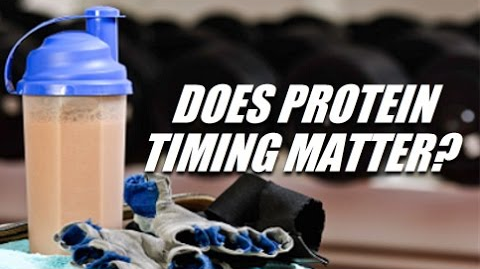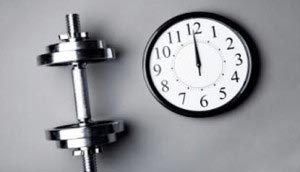DOES PROTEIN TIMING MATTER FOR BUILDING MUSCLE?

How Often to Eat Protein, and Does Protein Timing Matter?
In this article, we’re talking about the concept of protein timing.
In other words, does it really matter how you specifically space out your protein intake during the day? Whether it’s a larger amount of protein in fewer meals, or a smaller amount of protein over a larger number of meals?
You might be asking yourself some other questions, too. Such as, does protein timing matter when it comes to building muscle? And is it something that you really need to be worrying about?
Now, the simple overall answer for most people who are reading this is: not really.
However, like many things in fitness, it does ultimately come down to the individual. It also depends on your specific goals and how serious you are about squeezing out the absolute maximum percentage of your hypertrophy potential in the shortest period of time.
How to Maximize Hypertrophy

Let me explain what I mean by this.
The data on the subject is pretty mixed. Take this example of a study published in the Journal of the International Society of Sports Nutrition that shows exactly that.
Technically speaking, someone who spaces their protein intake out into more frequent feedings should (in theory) build muscle slightly more effectively than someone who is condensing all of their daily protein into a smaller number of feedings. 4to 5 individual doses of protein is a greater numerical value than 2 to 3.
However, in the same way that there is a limit on how high protein synthesis can be elevated over a given week or day, there’s also a limit on how much it can be elevated after a single meal.
Let’s say you eat 120 grams of protein in two servings of 60 grams each. That isn’t going to elevate protein synthesis to quite the same degree as eating those same 120 grams of protein in, say, four servings of 30 grams.
But, even though spacing your protein out more evenly over a larger number of feedings is technically superior, the difference will probably still be very minor. As long as the total amount of protein for the day as a whole remains the same, it really won’t make that much of a difference.
Unfortunately, I can’t put an exact number on it because there’s no absolute answer here.
But, if six meals a day gave you 100 percent of your possible potential muscle growth, maybe four feedings would still give you around 97 percent. Two feedings would still give you 94 percent.
These are just arbitrary examples as I’m just throwing numbers around to make my point. I don’t know what the actual numbers would be.
But in any case, the difference is probably small enough to where, for the average trainee, worrying about protein timing is likely just going to cause you additional unnecessary stress. It might probably even make your diet more complicated than it needs to be without really giving you anything significant in return.
Think of the Overall Picture When Trying to Build Muscle

I’ve talked about this many times before. It is very important to structure your program with the goal of maximizing long-term dietary adherence.
At the end of the day, you want to make choices in your fitness journey that will help you stick to it in the long term. If you really enjoy eating just 2 to 3 times a day rather than 5 to 6 times a day, then keep doing it.
Perhaps you find frequent meals to be a big inconvenience. Even if eating more frequently did help you squeeze out a few percent of extra results, you’ll probably be worse off in the long term. Why? Because you’ll have a much greater chance of getting burned out, and maybe even quitting. Not to mention that your overall life will be less enjoyable in general.
So, my overall recommendation on protein timing would be the following:
If you are an advanced trainee who is trying to fully maximize your genetic potential so you can compete, make a living from your physique, or bodybuilding is your main life focus, then protein timing is something you can optimize.
You can accomplish this by spacing your intake out more evenly over somewhere between 4 to 6 meals. If the possible inconvenience of doing that is worth it to you, just be aware that it’s likely only going to give you a small extra boost at best.
For example, if you can identify, say, three different areas of your program that could each improve your results by 3 percent each, then go ahead and do all of those things. Maybe it will add up to a near 10 percent improvement for your results in the overall picture, which would be worth it if that was the case.
Now, for everyone else who doesn’t fit the above description, just focus on hitting your overall protein needs for the day as a whole and space them into two meals at least. Maybe you’re still a beginner just trying to get the fundamentals down, or it’s just not worth it to you to potentially increase your gains by a few percent by rearranging your whole daily meal structure.
In that case, which probably describes the majority of people reading (including me), then stick with what you’re already doing. Also, if muscle growth is your primary goal, then ideally try to aim for three meals a day. Two will still be effective.
There are plenty of people out there who build great physiques using intermittent fasting for example. But if muscle growth is your primary aim and you can get in three-protein feedings, then I would say to go ahead and do it. Of course, if you just prefer having four or more protein feedings per day, then if that’s the ideal situation for you, continue.
Protein Timing and Pre/Post Workout Nutrition

Lastly, I want to touch on the idea of protein timing in relation to your workouts. Again, timing your protein feedings around your workout times is not something to overly stress about. The importance of highly specific pre and post-workout nutrient timing has been way overblown in the past.
In case you’re interested, here is a good meta-analysis that was done by Alan Aragon, Brad Schoenfeld, and James Krieger on this very subject.
All I would say on this is to just try to get in a basic serving of protein within a couple hours of your workout. Then, ideally you should follow that with another serving within a couple hours of finishing your workout. Waiting a little bit longer is fine.
Generally try to bracket your workout with some protein before and some protein after.
It doesn’t matter what type. It can be in solid or liquid form. (Though, you should prioritize getting it from the best protein sources to build muscle.) This is something that the majority of people will naturally do anyway without really thinking about it based on hunger alone.
The Bottom Line on Protein Timing
Protein timing is not something to get too worked up about.
Remember, total protein intake for the day as a whole is far more important than your specific protein timing. Unless you’re an advanced trainee trying to gain every ounce of muscle possible, it’s not something to tightly focus on. Just try spacing protein feedings into 2 or 3 per day.
On workout days, try to have those feedings within reasonable proximity to your training session.
If you found this article helpful, make sure to sign up for your FREE custom fitness plan below...




